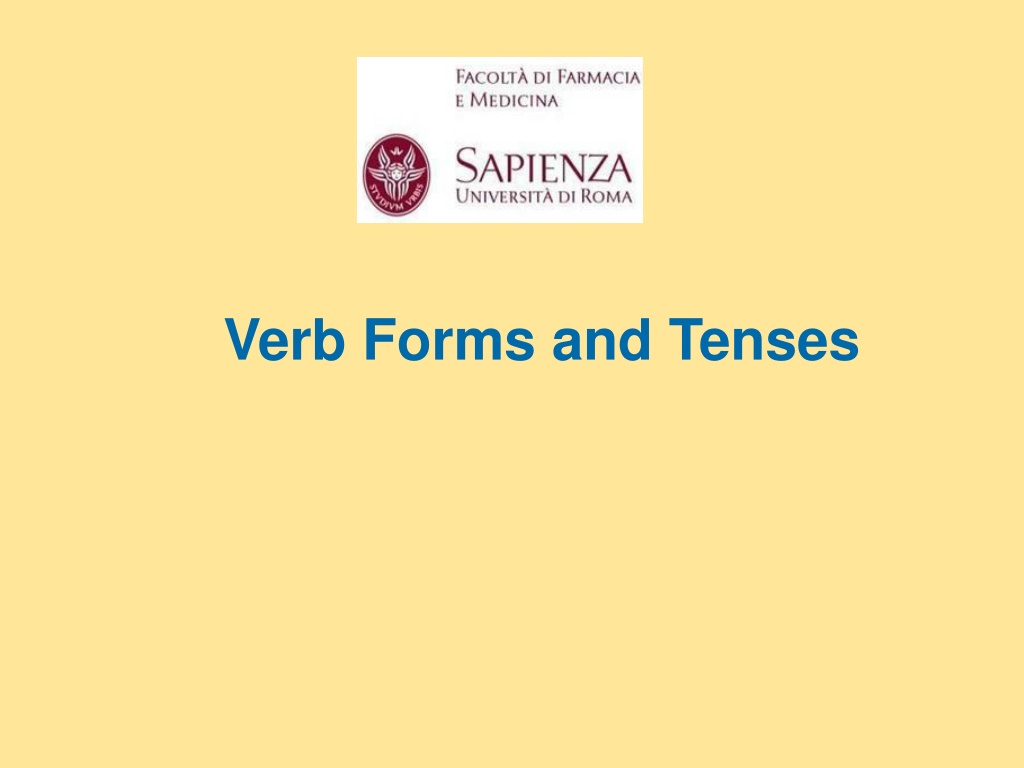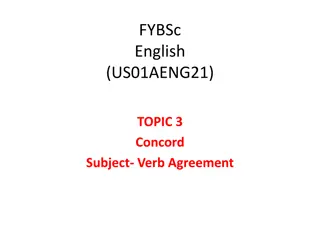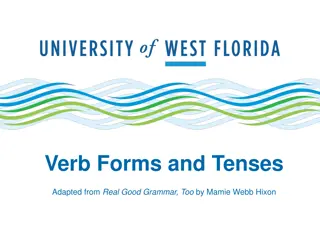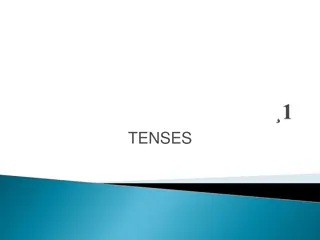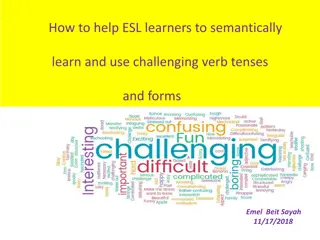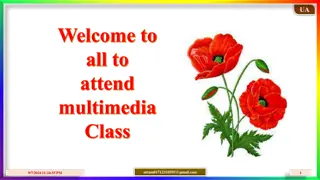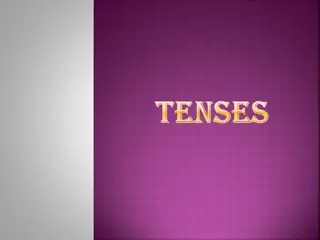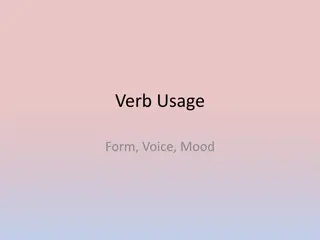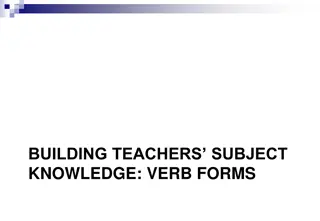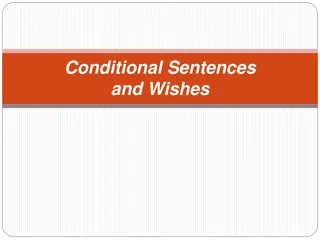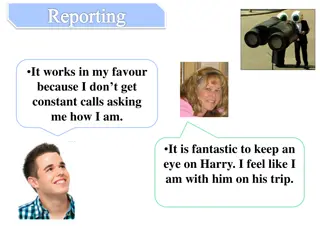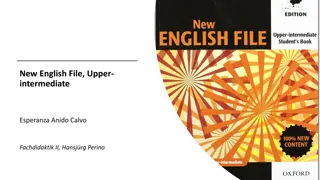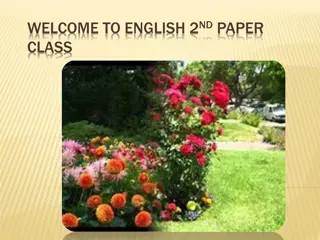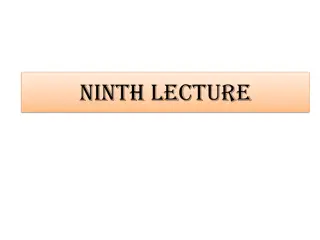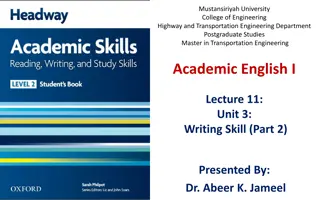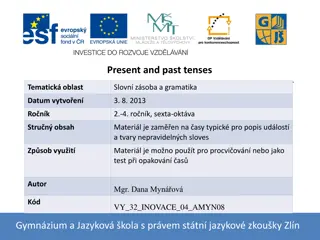Understanding Verb Forms and Tenses in English
Explore the different verb forms and tenses in English, including past, present, and future, as well as simple, continuous, perfect, and perfect continuous aspects. Learn how to use verb forms to create various tenses and understand when to use present, past, or future tense in different contexts.
Download Presentation

Please find below an Image/Link to download the presentation.
The content on the website is provided AS IS for your information and personal use only. It may not be sold, licensed, or shared on other websites without obtaining consent from the author. Download presentation by click this link. If you encounter any issues during the download, it is possible that the publisher has removed the file from their server.
E N D
Presentation Transcript
TIME & ASPECT Each English Verb has 2 Basic Elements (Forms) 1. TIME : Past, Present , Future 2. ASPECT Simple, Continuous, Perfect, Perfect Continuous,
PAST PRESENT FUTURE SIMPLE Past Simple Present Simple Future Simple CONTINUOUS Past Continuous Present Continuous Future Cont. PERFECT Past Perfect Present Perfect Future Perfect PERFECT CONTINUOUS Past Perf. Cont. Pres. Perf. Cont. Future Perf. Cont. - I was having dinner this time yesterday Past (time) Continuous (aspect) - He s (has) been sitting there for hours Present (time) perfect continuous - Where will you be next week? Future Simple
Build-up the Verb Forms Every English verb - except (to) be , has 5 forms, Be aware of the irregular forms! The Verb Forms infinitive (to) type (to) text (to) write present (-s) types texts writes present participle (-ing) typing texting writing past (-ed) typed texted wrote past participle (-en) (have) typed (have) texted (have) written
Verb Forms and Tenses Verb tense is the ability of a verb to indicate the time at which an action takes place. Verb forms are the tools you ll use to create tenses.
Use present tense in universally true statements not limited to a particular time: The Sun is ninety-three million miles from Earth. in definitions: Hardware is the physical system of a computer. in statements about the content of literature and other published works: Hamlet appearsextremely indecisive.
Use present tense - for events that are currently happening: - for events that are repeated in time I am really mad at Anthony. Andrea attends mass every week. now/the present the distant future the distant past am, attends the near past the near future
Use past tense for an earlier action: John bought that car last year. now/the present the distant future the distant past bought the near future the near past
Use of Simple Future for an earlier action (single or repeated): 1. Jane will go to the gym every Friday 2. Jane will go out tonight to celebrate her friend s birthday the distant future now/the present the distant past Every Friday Will go tonight the future the near past
SIMPLE VERB FORMS Past-Present-Future 1. Single actions I went to Paris (Simple past) I will go with you (Simple Furure) 2. Repeated actions or states I go to school by bus (Simple present) I played tennis for 20 years (Simple past) I will go with you every Tuesday, but not any other day (Simple Furure)
Continuous Verb Forms I was eating dinner at 6 o clock last night (Past Continuous) He is eating an apple-pie (Present Continuous) In a week time, I will be eating at the seaside! (Future Cont.) be + -ing verb
Use of the Continuous form Generally the continuous form describes things/actions that are incomplete Continuous = be ing verb I was eating dinner at Mc Donald She was telling me a really interesting story. They aren t helping at all. It will be getting dark at 6 o clock I was eating .. Start eating Finish eating PAST FUTURE PRESENT
Use present infinitive for verbs that point to the future: I hope to complete my degree by the time we get married. She planned to earn an MBA by the end of the year. now/the present the distant future the distant past to complete, to earn hope, plan the near past the near future
Use present perfect tense for an action that began in the past but continues into the present or the future: I have lived in Italy all my life. She has finished her essay right now. now/the present the distant future the distant past have lived the near past the near future
Use a present participle for an action that occurs at the same time as the verb: Speedingdown the interstate, I saw a police car. now/the present the distant future the distant past speeding + saw the near past the near future
Use past perfect tense for an earlier action that is mentioned after a later action: Marvin bought the car that he had seen advertised online. now/the present the distant future the distant past bought had seen the near past the near future
Use future tense for an action that will be completed: I will graduate from college. now/the present the distant future the distant past will graduate the near past the near future
Use future perfect tense for an action that will have been completed at a specific future time in relation to another specific time: By 2020, I will have graduated from college. now/the present the distant future the distant past will have graduated 2020 the near past the near future
Mood Mood enables verbs to express how the speaker or writer regards the sentence. Mood can express attitudes, intentions, commands, wishes, recommendations, and possibilities.
Use subjunctive mood to express a condition contrary to fact or a wish: If I were President, I d work with Congress to protect the environment. You are not the President. You ll have to protect the environment without the help of Congress. The CFO would have been terminated a long time ago were she not the CEO s niece. The CFO is the CEO s niece, so she s still hanging around.
Use subjunctive mood to express insistence, importance, necessity, or urgency after the word that : It is important that you beon time. We demand that the company dosomething about its toxic waste. The syllabus requires that each student write a research paper. Note: Use the base form of a verb (e.g. be instead of are ) because if you use the present form the problem isn t urgent the person is already doing what you ve asked!
